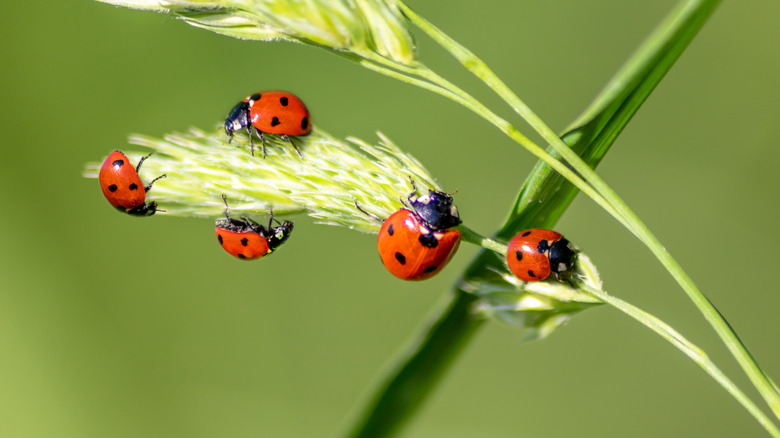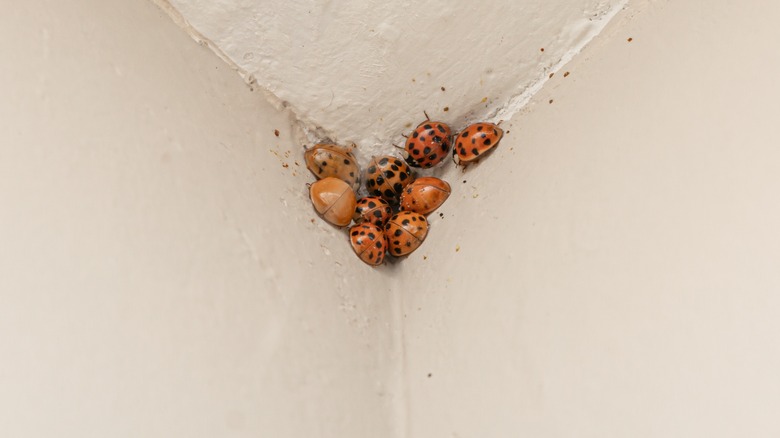Should You Use Cinnamon To Keep Ladybugs At Bay?
Whether you call them ladybugs or lady beetles, many species of these insects can be beneficial to a garden. In fact, some gardeners attract them purposely to dine on aphids — one of their favorite snacks — along with other pests like spider mites, whiteflies, and small caterpillars, as noted by University of Maryland Extension. Since they aren't poisonous and don't bite unless they're earnestly provoked, most of the time ladybugs aren't a nuisance you want to eliminate unless they get too aggressive with their garden dining. That can change in the fall and winter, too, when adult ladybugs tend to congregate in groups looking for warmth and start trying to enter homes. Many insects don't stand a chance against cinnamon, but are ladybugs among them? Not really.
If they find a way to get inside your home to hibernate, you might notice ladybugs bunched up on a windowsill, nestled in a corner, or clustered in a crawl space, which is bothersome to say the least. Don't bother sprinkling cinnamon in those areas, however, because it's not the most effective repellent for this type of beetle. There are some other non-toxic things you can try that reportedly offer much better results, including peppermint oil.
Alternatives that keep ladybugs away
Remember the old saying about prevention being worth a pound of cure? Well, that's certainly true with ladybugs as far as keeping them out of your house goes. To keep ladybugs out in the first place, make sure that you check the caulking around windows for gaps that need to be filled. Replace bent window screens and repair any holes that might be an entry point, too.
If they sneak in to hibernate anyway, you'll want to remove them (it's easy to sweep them up and relocate them since they aren't very active while overwintering) and then treat the area to discourage a repeat performance. One of the best things to use for this purpose is peppermint oil since they don't like the smell. If you don't have peppermint oil on hand, you can try citrus oils or citronella, along with bay leaves, and cloves. Ladybugs reportedly find all of them to be odiferous rather than pleasantly scented. When using scented oils, a good way to transmit the scent is by putting a few drops on several cotton balls and leaving them where the insects are prone to congregate. Bay leaves or cloves can be placed in small dishes. You can try the same scents in your garden — especially peppermint oil mixed with water — if you find that ladybugs are becoming a problem there as well.
Home and garden issues related to ladybugs
While a gathering of ladybugs in your home may not be overly harmful, most people don't like a big bunch of insects huddling around no matter how cute they happen to be individually. But when it comes to actually causing an issue you can see and want to avoid, the most likely result of their presence is stubborn yellow staining on paint, fabric, or other surfaces where they decide to hibernate during the winter. Keeping them away with peppermint oil or one of the other scents they don't like solves this problem before it happens.
Even in a garden, there are times when ladybugs get too aggressive and eat the leaves on vegetation or leave holes in them as they munch on small insects. If you notice this happening, you can mix peppermint oil with water and spritz your plants with it. Avoid using full strength peppermint oil on plants, though, since it can be too harsh without diluting it. Another solution is to plant mint or chrysanthemums near your garden to repel ladybugs. With a little effort you can employ the right scents to keep ladybugs at bay, but now you know not to waste your cinnamon for this purpose.


